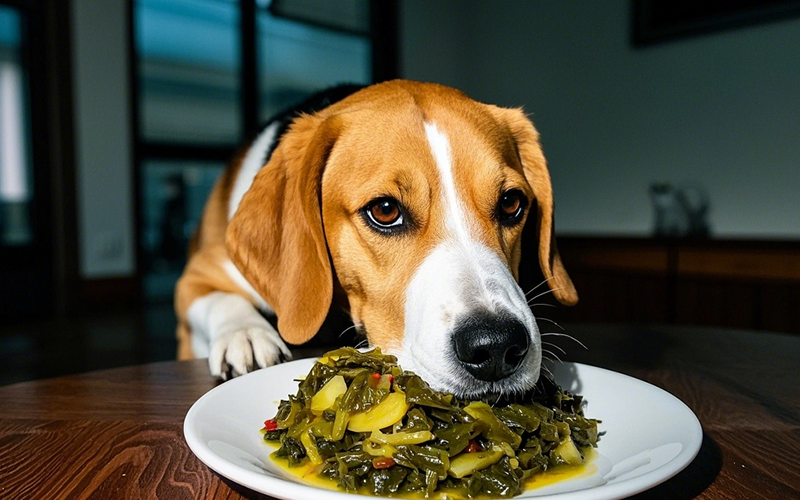Can Dogs Eat Sauerkraut? Understanding the Safety of Sauerkraut for Dogs
- 24 Mar 2025 14:09
Sauerkraut, a popular fermented food made from cabbage, is often enjoyed by humans for its tangy flavor and potential digestive benefits. But can dogs eat sauerkraut? The answer isn’t as simple as yes or no—it depends on a few factors. Let’s explore why sauerkraut might be risky for your dog and how to safely incorporate it into their diet if desired. 🥬🐕

Why Sauerkraut Can Be Risky for Dogs
1. High Sodium Content
One of the biggest concerns when feeding sauerkraut to dogs is its high sodium content. Most commercial sauerkraut is salted during fermentation, and consuming too much sodium can lead to salt poisoning in dogs. Symptoms of salt poisoning can include vomiting, diarrhea, excessive thirst, and lethargy, which can be very dangerous if left untreated. 🧂
2. Fermentation and Gas
Sauerkraut is fermented, which means it contains live bacteria (probiotics) that are good for digestion in humans. However, the bacteria in sauerkraut can cause gas or bloating in dogs, especially if they aren’t used to fermented foods. This could lead to discomfort or digestive upset, and in some cases, it could trigger more severe issues like gastric dilatation volvulus (GDV), commonly known as bloat. 😷
3. Potential for Stomach Upset
The acidity of sauerkraut, combined with its high fiber content, can irritate your dog’s stomach and cause gastritis (inflammation of the stomach lining), especially if they have a sensitive digestive system. This could lead to symptoms like vomiting, diarrhea, and stomach pain. 🍽️
Can Dogs Eat Sauerkraut in Small Amounts?
In small amounts, sauerkraut may not pose a significant threat to most dogs, but it’s still important to proceed with caution. If you want to give your dog a tiny taste, ensure the sauerkraut is low in salt, and offer it in very small portions. This can reduce the risk of digestive upset or sodium poisoning. 🐾
How to Safely Feed Your Dog Sauerkraut
If you’d like to give your dog a taste of sauerkraut, here are some important things to keep in mind:
1. Choose Low-Sodium Sauerkraut
Look for sauerkraut that is specifically labeled as low-sodium or unsalted. This will help reduce the risk of your dog ingesting too much salt. Avoid store-bought varieties that are heavily salted or contain added preservatives. 🥒
2. Serve in Small Portions
If you want to introduce sauerkraut to your dog’s diet, start with a very small amount to see how your dog reacts. Stick to one teaspoon or less for smaller dogs, and one tablespoon for larger dogs. If your dog tolerates it well, you can continue feeding it occasionally, but always keep portions small. 🍴
3. Watch for Signs of Discomfort
After giving your dog a small portion of sauerkraut, keep an eye out for signs of stomach upset, including bloating, diarrhea, or vomiting. If any of these symptoms occur, discontinue feeding sauerkraut and consult a pet health professional. 📞
Healthier Alternatives to Sauerkraut for Dogs
If you want to give your dog probiotics or aid their digestion, there are safer alternatives that are better suited to their digestive system:
Plain, unsweetened yogurt: A small spoonful of plain yogurt can offer beneficial probiotics to support gut health, without the risks associated with sauerkraut.
Canned pumpkin: Known for its fiber content, pumpkin is gentle on your dog’s stomach and can help with digestion.
Dog-safe probiotic supplements: These are designed specifically for dogs and can support their digestive health without the potential risks of sauerkraut.
The Bottom Line: Can Dogs Eat Sauerkraut?
While dogs can eat sauerkraut in very small amounts, it’s generally not recommended due to the risks associated with its high sodium content and potential for digestive upset. If you do decide to give your dog a taste, make sure the sauerkraut is low in salt and serve it in moderation. Keep an eye on your dog for any signs of discomfort, and consult a pet health professional if you have concerns. 🐕💡
For ongoing guidance and quick consultations, PettureX provides 24-hour online consultations with pet image recognition, so you can get expert advice whenever needed. 📱
Keep your dog safe by choosing healthier, dog-friendly alternatives to sauerkraut for better digestion and overall well-being! 🌟
Related

Why is Regular Dog Grooming So Important?
- 21 Jun 2025
Can Dogs Eat Kiwis? A Vet-Approved Guide to This Fuzzy Fruit
- 10 Jun 2025
Can Dogs Eat Curry? Unpacking Risks, Benefits, and Safe Alternatives for Your Canine Companion
- 3 Jun 2025
Can Dogs Eat Cooked Carrots? A Crunchy & Colorful Canine Query!
- 29 May 2025
Can Dogs Eat Cooked Cabbage? Unveiling the Crunchy Truth for Your Canine!
- 29 May 2025
Can Dogs Eat Citrus? Peeling Back the Zesty Truth for Your Pup!
- 28 May 2025
Can Dogs Eat Cinnamon Applesauce (A Little Bit)? The Sweet and Spicy Truth!
- 28 May 2025
Can Dogs Eat Chorizo? Sizzling a Warning for Your Furry Friend!
- 27 May 2025
Can Dogs Eat Chili? A Spicy Topic for Canine Consumption!
- 27 May 2025
Can Dogs Eat Raw Chicken? Unveiling the Risks and Realities
- 26 May 2025
